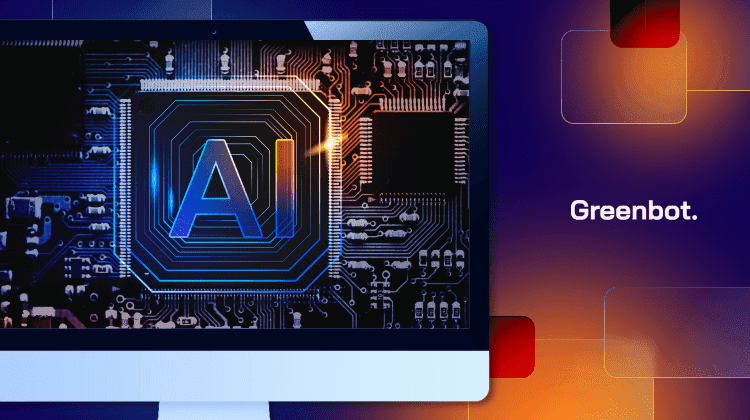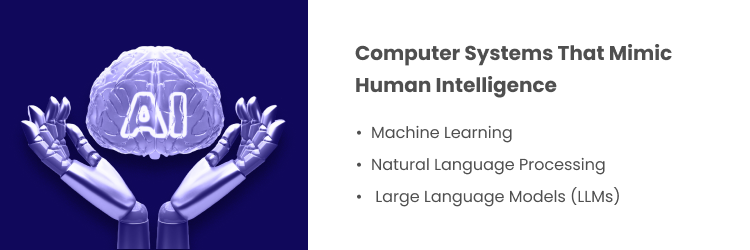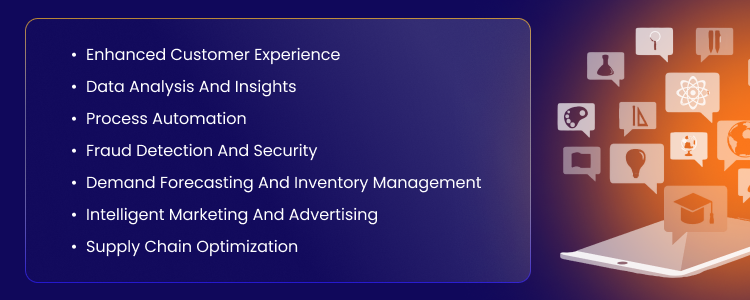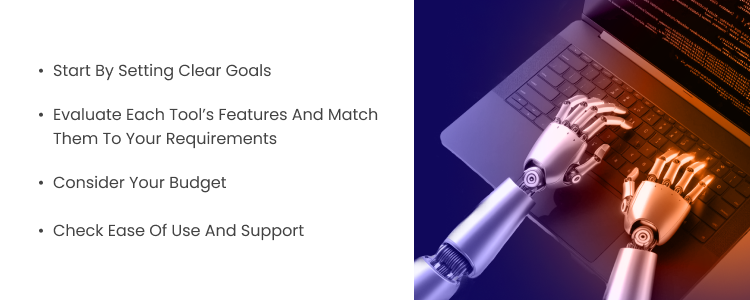
Businesses and professionals strive to make smarter decisions and gain valuable insights from data. AI makes this easier and more impactful by automating tasks, analyzing data, and streamlining workflows. These advancements improve productivity and help professionals stay competitive.
AI is transforming industries by boosting efficiency and enabling smarter decision-making. It helps organizations face challenges and get better results with new tools and solutions.
This article will explain how to use AI, its types, applications, and the best tools for success across industries.
What Is Artificial Intelligence?
Artificial Intelligence (AI) refers to computer systems that mimic human intelligence. These systems perform tasks like decision-making, problem-solving, and recognizing patterns.
Machine learning and natural language processing help AI analyze data and adapt. AI chatbots and automation show how AI is changing industries. They improve efficiency and user experience.
AI’s evolution began with Alan Turing’s work in the 1950s. His theories introduced the idea of machines solving complex problems. Neural networks gained prominence in the 1980s, enabling systems to process data more effectively. Breakthroughs like large language models (LLMs) and GPT have revolutionized fields like robotics, healthcare, and finance. These advancements continue to reshape industries.
Key AI concepts include training data, algorithms, and models. For instance, machine learning uses datasets to identify patterns and improve predictions. Deep learning relies on neural networks for image recognition and speech synthesis tasks. These technologies help businesses automate workflows and boost productivity.
Experts, however, emphasize the importance of AI Ethics to mitigate bias and promote ethical decision-making, fostering trust in AI-powered systems.
Types of AI Technologies
- Machine Learning (ML): Machine learning enables systems to learn from data and improve over time without explicit programming. It powers tools like recommendation engines and fraud detection systems. For example, e-commerce platforms use ML to analyze customer behavior and suggest products.
- Natural Language Processing (NLP): NLP allows machines to understand, interpret, and respond to human language. It is the backbone of tools such as AI chatbots and language translation apps. Businesses use NLP for customer service automation, such as resolving queries through chatbots.
- Computer Vision: Computer vision enables machines to interpret visual data from the world around them. Applications include facial recognition, self-driving cars, and quality inspection in manufacturing. For instance, healthcare uses computer vision to analyze medical images and detect anomalies.
- Robotics: Robotics integrates AI with physical machines to perform tasks autonomously. From warehouse automation to surgical robots, this technology improves efficiency and precision. Industrial robots, for example, are widely used for assembly-line tasks, reducing human effort and errors.
- Deep Learning: Deep learning is a subset of ML that uses neural networks to mimic the human brain. It is critical for tasks like image recognition and speech synthesis. Companies use deep learning to create virtual assistants and improve drones and self-driving cars.
- Expert Systems: Expert systems simulate the decision-making abilities of a human expert. These systems are used in medical diagnosis, financial analysis, and troubleshooting technical issues. For example, a medical expert system can analyze patient symptoms. It can then recommend diagnoses.
Applications of AI in Business
Enhanced Customer Experience
AI offers some of the best ways to use AI in business, such as transforming customer interactions. AI chatbots and recommendation systems provide personalized help and product suggestions. For example, e-commerce platforms use these solutions to improve customer satisfaction and retention.
Data Analysis and Insights
AI processes large datasets fast, uncovering patterns and trends. This enables businesses to make informed decisions faster. For example, predictive analytics helps companies forecast market changes and adjust strategies. AI’s ability to generate actionable insights is crucial in finance and retail.
Process Automation
AI automates repetitive tasks across HR, accounting, and IT operations. It screens candidates in HR, processes invoices in accounting, and monitors systems in IT. By reducing manual effort, AI enables employees to focus on strategic goals for greater efficiency and productivity.
Fraud Detection and Security
AI strengthens security by identifying anomalies in real time. It monitors transactions to detect fraud and potential threats. For instance, banks use AI to prevent unauthorized activity by flagging suspicious behavior. AI also analyzes cyberattack patterns, providing proactive defenses against digital threats.
Demand Forecasting and Inventory Management
AI tools predict sales trends and optimize inventory levels. This minimizes overstocking and prevents shortages. Grocery chains, for example, rely on AI to track buying patterns and manage seasonal demand. By improving accuracy, AI reduces waste and cuts costs for businesses.
Intelligent Marketing and Advertising
AI personalizes marketing campaigns through advanced audience targeting. Predictive analytics identifies customer preferences, enabling tailored messaging. AI platforms optimize ad performance by suggesting keywords and strategies. For example, digital ad tools use AI to maximize return on investment for businesses.
Supply Chain Optimization
AI improves supply chain efficiency by analyzing logistics and tracking shipments. It predicts delays and recommends optimal delivery routes. E-commerce companies use AI to streamline warehouse operations and ensure timely deliveries. These tools reduce costs while maintaining high customer satisfaction.
AI Tools for Professionals
- ChatGPT for Communication and Problem-Solving. ChatGPT increases workflows by providing instant responses, generating ideas, and drafting professional emails. Professionals use it to brainstorm solutions, create project outlines, and automate interactions. For instance, ChatGPT can draft detailed client communication, saving time while maintaining professionalism.
- Jasper for Marketing and Content Creation. Jasper simplifies marketing. It generates blog posts, ad copy, and email campaigns for specific audiences. It ensures brand consistency and automates repetitive writing tasks. Marketers can use Jasper to create personalized email campaigns in minutes.
- Grammarly for Writing and Editing. Grammarly enhances clarity and professionalism in written communication. It detects grammar issues, refines tone, and ensures content accuracy. Ideal for reports, emails, and presentations, Grammarly helps professionals communicate effectively and confidently.
- Canva for Visual Content Design. Canva enables professionals to create attractive presentations, social media posts, and marketing materials. Its AI tools suggest design elements and layouts based on user input. Canvas templates let users quickly create polished graphics, even without design experience.
- Notion AI for Task Management and Documentation. Notion AI combines task management with smart automation to streamline workflows. It generates meeting notes, automates task creation, and organizes project documentation. Teams working on complex projects use Notion to stay organized and productive.
Intelligent Task Automation
Tools like Zapier automate repetitive tasks such as scheduling and data entry. Zapier connects apps to streamline workflows, like auto-scheduling meetings based on team availability. This frees up time for professionals to focus on strategic work.
Language Translation and Transcription
DeepL provides real-time translations for seamless global communication. Transcription tools like OTranscribe convert audio to text. They help professionals in media, legal, and multilingual fields by making tasks more efficient.
Summarizing Research
ChatGPT and SciSummary simplify long documents into short summaries. For example, SciSummary helps professionals quickly grasp research papers’ main points. It saves time in busy environments.
Design and Creativity Support
Adobe Express simplifies visual content creation, while MidJourney generates artwork based on prompts. These tools inspire creativity and deliver polished visuals for branding and marketing.
Time and Project Management
Jira AI and Asana AI help track tasks, summarize updates, and prioritize activities. They fit into workflows to keep teams on track and meet deadlines.
Pricing and Revenue Optimization
ProfitWell and Cushion analyze customer trends and behavior. Cushion, for example, helps freelancers plan income, spot slow periods, and set smarter prices.
Programming and Code Generation
GitHub Copilot supports developers by generating code snippets, creating templates, and debugging errors. These tools enhance productivity, allowing developers to focus on refining their final implementations.
Choosing the Right AI Tools for Your Needs
Start by setting clear goals. Identify tasks to improve, such as automation, customer engagement, and data management. Clear objectives guide you to tools that meet your needs.
Evaluate each tool’s features and match them to your requirements. Content creators may benefit from Jasper or Grammarly, while project managers could use Asana AI or Jira AI. To avoid disruptions, focus on tools that integrate with your current systems.
Consider your budget. Many AI tools offer free and paid versions. Free options like OTranscribe handle basic tasks, while paid tools like Otter.ai offer advanced features like real-time transcription and collaboration. Compare costs with the value provided to ensure a good investment.
Finally, check ease of use and support. Look for user-friendly tools with training resources and responsive customer service. A smooth onboarding process reduces learning curves and encourages adoption. Align tools with your goals, budget, and usability to make smart, effective choices.
Implementing AI in Your Workflow
Consider the following steps:
- Identify repetitive tasks such as scheduling, data entry, or customer communication
- Choose AI tools for these tasks
- Automate them with project management software
- Use transcription tools for meeting notes
- Focus on tasks where AI can provide clear benefits
- Before full implementation, test the tool on a small project
- Ensure it works well with your systems, such as CRM or communication platforms
- Gather feedback and make adjustments to ensure a smooth transition
Additionally, train your team to use the tool effectively and hare tutorials highlighting key features. It is also recommendable to regularly track performance to confirm its value and adapt its use as your needs change.
Ethical Considerations in AI Usage
AI offers immense potential, but its use raises serious ethical concerns. One key issue is bias and discrimination in systems trained on massive datasets, which often reflect societal biases. According to Capitol Technology University, such biases can lead to unfair outcomes in hiring or lending. For example, an AI-powered chatbot used for candidate screening might perpetuate biased practices. To counter this, companies must audit their algorithms and use inclusive datasets.
Another primary concern is transparency and accountability. Many AI tools, especially in healthcare AI, function as “black boxes”, making it hard to understand how decisions are made. For example, a machine learning model must clearly explain its predictions on patient outcomes. As Capitol Technology University notes, explainable AI is crucial for building trust. Organizations also need clear protocols for addressing errors or harm caused by AI systems.
Future Trends in AI
AI is advancing rapidly, and 2024 marks a major milestone for new trends. Generative AI is transforming content creation. It generates custom text, images, and videos, making these tools accessible to more people. Free AI tools are helping individuals and small businesses use AI for automation and creativity. This expansion makes AI more impactful and widespread.
Machine learning advancements are driving progress in autonomous systems and predictive analytics. AI is also changing search engine optimization (SEO). By analyzing user behavior, it improves website performance. At the same time, online courses are teaching professionals how to use AI and stay competitive.
Ethical concerns like fairness, transparency, and accountability remain vital as AI grows. Responsible use will ensure AI’s benefits outweigh its risks.
FAQs
Can I use AI for free?
Yes, many AI tools offer free versions with basic features. These tools help with tasks such as transcription, writing, and design. They make it easy to explore AI without upfront costs, and free options are a great starting point for leveraging AI.
How do I start using AI for work?
First, find repetitive or time-consuming tasks. Examples include scheduling, customer communication, and data entry. AI tools can automate these tasks, freeing up time for strategic work. Begin with simple tools, test their effectiveness, and expand their use as needed.
What are the best AI tools for small businesses?
Small businesses can use AI tools to improve efficiency and streamline operations:
- Jasper: Automates content creation for blogs, ads, and emails
- Notion AI: Organizes workflows and automates documentation
- ProfitWell: Analyzes customer data to optimize pricing and revenue
- ManyChat: Offers affordable AI chatbots for customer engagement
How can professionals learn to use AI tools effectively?
Learn through online courses, tutorials, and user guides provided by AI platforms. Start with basic tasks, practice, and gradually explore advanced features. Continuous learning and experimentation are key to mastering AI tools.
Are there risks to relying on AI for decision-making?
AI can have biases if trained on flawed data, leading to unfair outcomes. It can also lack transparency, making decisions hard to interpret. To reduce risks, regularly audit AI systems and use them to support, not replace human judgment.
What industries see the highest ROI from AI adoption?
Industries like healthcare, finance, and retail benefit greatly from AI:
- Healthcare: Enhances diagnostics and personalizes treatments.
- Finance: Improves fraud detection and risk assessment.
- Retail: Powers recommendation engines and demand forecasting, boosting efficiency and customer satisfaction.
Can AI be affordable for freelancers or small teams?
Many AI tools have budget-friendly plans for individuals or small teams. These tools improve productivity and automate workflows. They help freelancers and small businesses stay competitive without breaking the bank.
Final Thoughts
AI boosts productivity, streamlines workflows, and drives innovation. It helps with tasks like data analysis and personalized marketing, making work easier and more effective. The right tools let professionals achieve better results.
Responsible use of AI is vital. Professionals must ensure data privacy, fairness, and accountability. Ethical practices and transparency are key to using AI effectively. AI can promote progress and create a better future when balanced with responsibility.

























